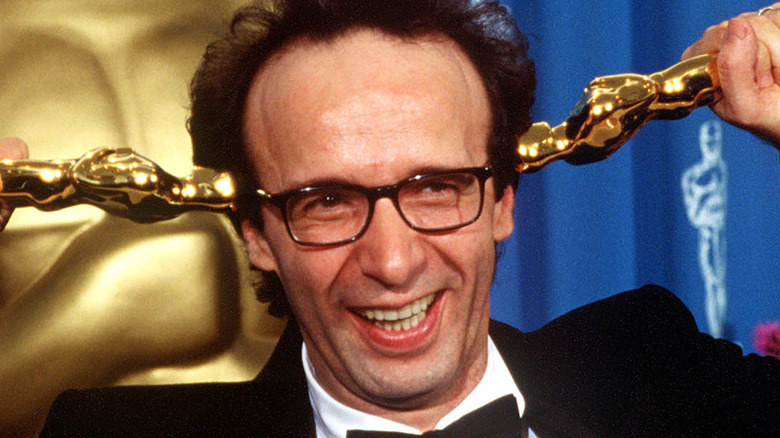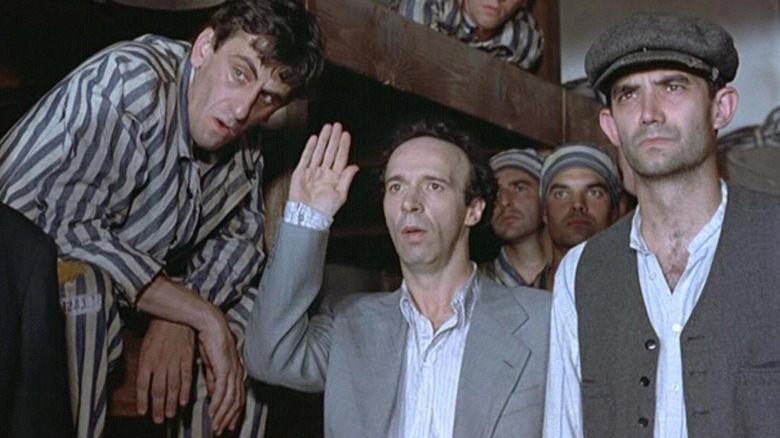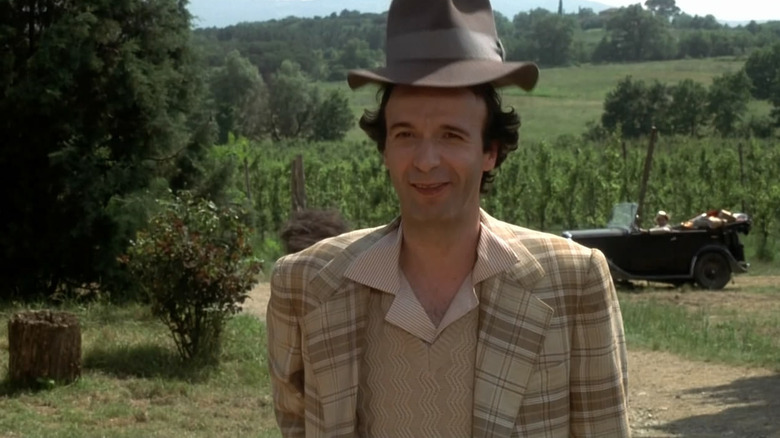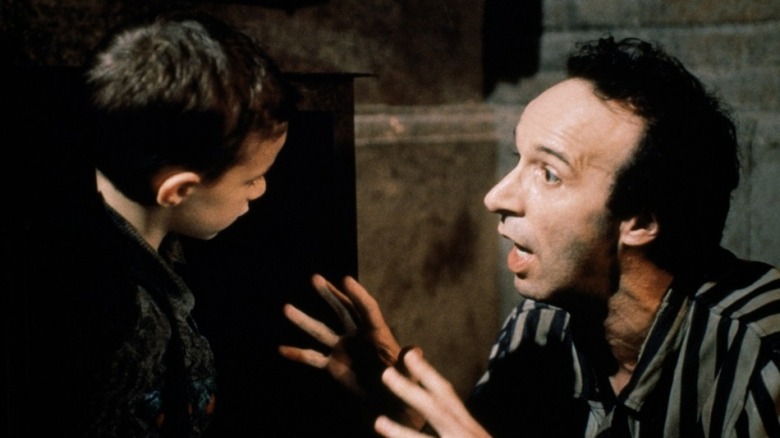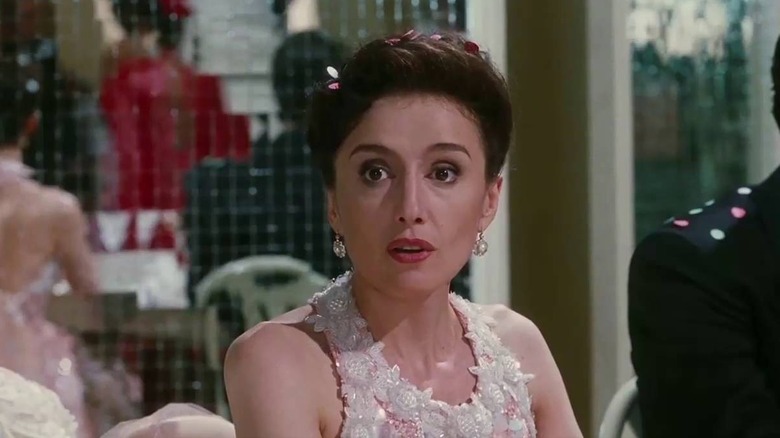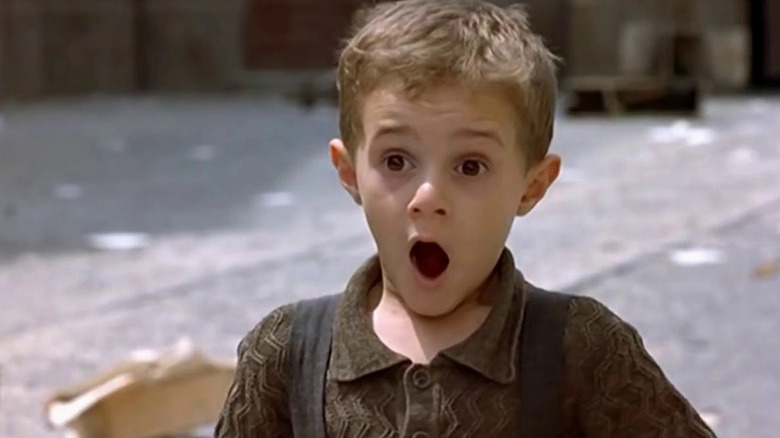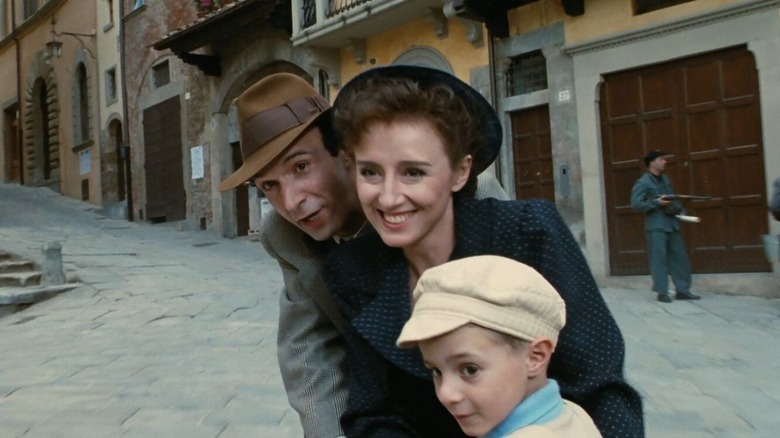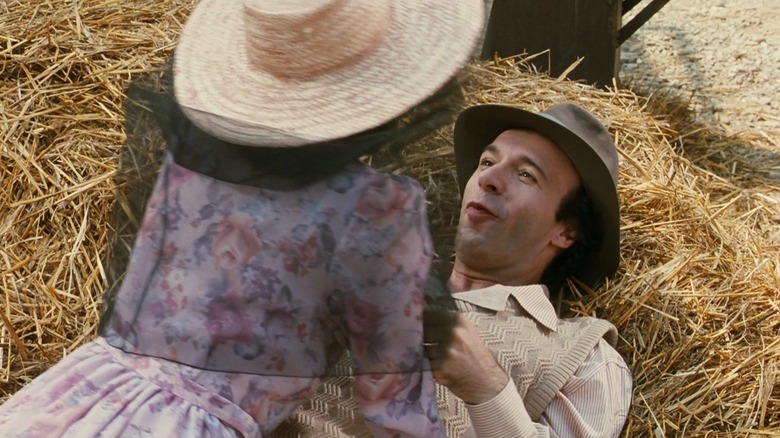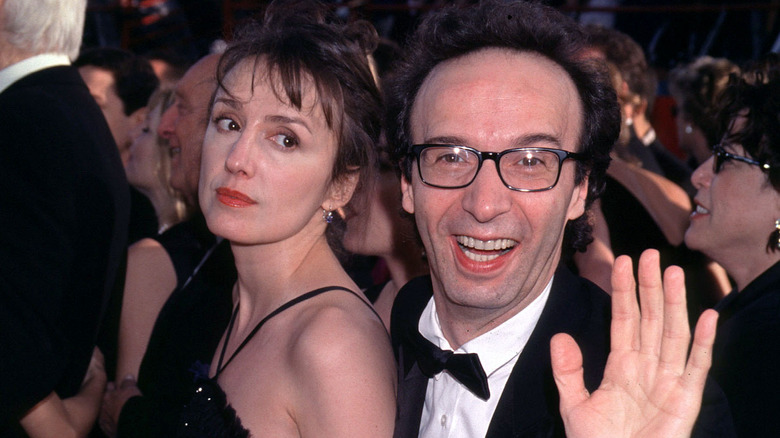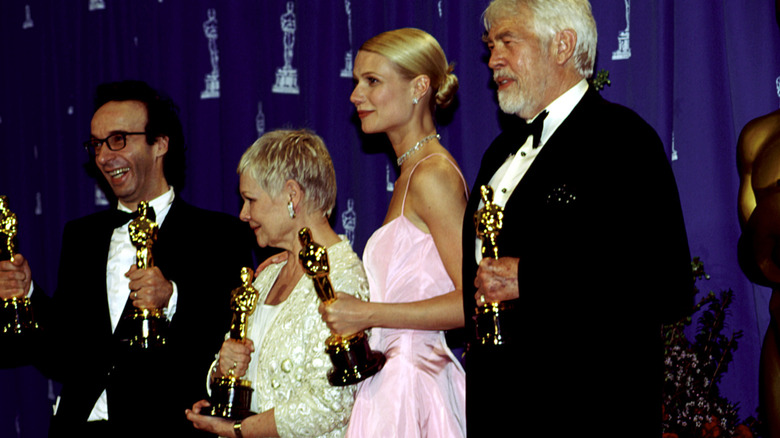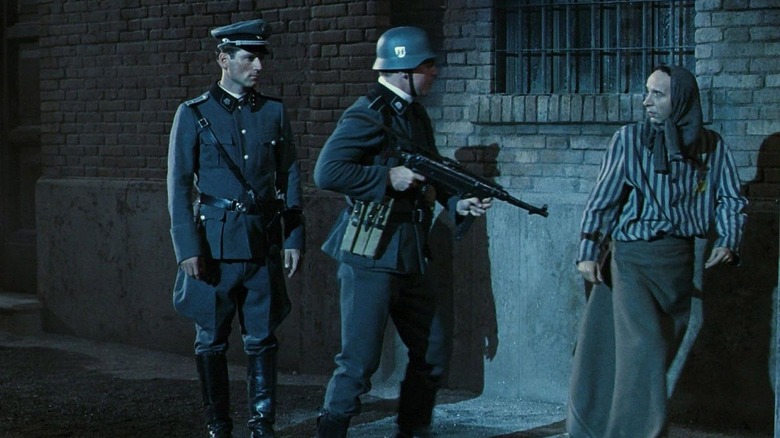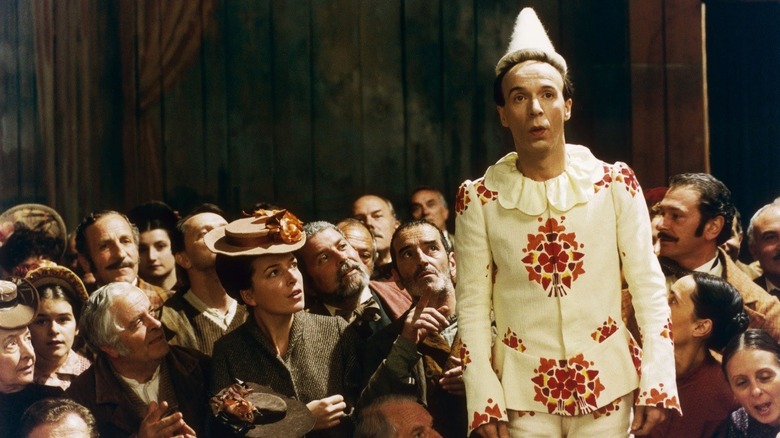The Untold Truth Of Life Is Beautiful
Film aficionados in the late 1990s found themselves falling in love — first through good word of mouth or eventually through its prestige marketing campaign — with a most unusual movie. It was foreign, it featured a longtime international star who had previously failed to make inroads domestically, it was a comedy about the Holocaust(!) — yet somehow, it became an awards season sensation.
Its sentimental title did little to give the movie away. "Life is Beautiful" sounds as though it could just as easily be a period romance, or perhaps an inspirational story about overcoming impossible odds. In some ways, Roberto Benigni's Italian sleeper hit was both of those things. In others, there had never been anything like it before — and although some have attempted, nothing since either.
There's an adorable love story at its core, even as its family of protagonists endures unimaginable hardship. But it's also a comedy that laid the groundwork for films from "The Pianist" to "Jojo Rabbit." Today, history remembers "Life is Beautiful" as a high risk, high reward proposition that, at least for a time, made its director, co-writer, and lead actor a superstar. But its place in cinematic history is also a little more complicated; here's how "Life is Beautiful" came to be, and what has since become of it.
It's based on a book
Benigni's idea to make a (somewhat) lighthearted family movie that partially takes place in a concentration camp didn't come out of nowhere. The comedian co-wrote the script for "Life is Beautiful" with his frequent collaborator Vincenzo Cerami (an Italian poet, novelist, and screenwriter of more than 40 films), and the duo based their work on a piece of non-fiction called "In the End, I Beat Hitler."
That book, by Holocaust survivor Rubino Romeo Salmoni, is as ambitious in its tone and subject matter as is Benigni's film. It recounts Salmoni's experiences as a young Jewish Italian man in Rome, and then at Auschwitz during the time of the second World War. As Hitler's influence led Italian fascist police to round up and imprison Jews in their own country, Salmoni managed to avoid arrest. His luck ran out in 1944, however, when he was sent to Auschwitz and forced to work in labor camps, nearly starving to death.
"At Auschwitz I was no longer Rubino Romeo Salmoni, but Jew number A15810, to be exterminated," he wrote. While Salmoni's prose discusses the most grim of circumstances, it is infused with a warm, deflective humor and stubborn hope — this inspired Benigni, and he became determined to emulate it in the film.
"I have a wonderful family," the author later said of his life. "I celebrated my golden wedding anniversary, I have 12 splendid grandchildren — I think I can say I ruined Hitler's plan for me."
Benigni's father was also an inspiration
When it came to how Benigni would portray the fun-loving father at the center of the film, he was further inspired by a source closer to home.
The Italian filmmaker's father Luigi Benigni wasn't Jewish, but he did spend time in a German labor camp for a period of two years. Like Salmoni, he nearly died of starvation — but also like Salmoni, he lived to tell his story, and went on to have children of his own. When it came time to talk about his experience, Luigi Benigni was known to use a blend of tragedy and comedy to communicate the horrors of World War II and of the Holocaust in a way that would allow his kids to be able to sleep at night.
Although Salmoni's book provides much of the basis for the main "Life is Beautiful" character of Guido Orefice, Benigni's characterization of the man as a Charlie Chaplin-like dreamer comes from his father. Perhaps nowhere is this more evident than in a key scene where Guido comforts his son.
"The game starts now," he says, making the danger inherent in the concentration camp into a game of fantasy and adventure. "You have to score one thousand points. If you do that, you take home a tank with a big gun. Each day we will announce the scores from that loudspeaker." In another scene, when his son spies anti-Semitic graffiti that reads "No Jews or Dogs Allowed," Guido responds that everyone has something that they don't like, and that their bookstore should put up a sign that says "No Spiders or Visigoths."
Friends advised against him making it
Prior to "Life is Beautiful," Benigni was known primarily as a screwball comedian, mostly in his home country. He starred in broad comedies like 1984's "Nothing Left to Do but Cry" (about a couple who goes back in time to try to stop Columbus from "discovering" the Americas), and had small American releases of his 1991 mobster comedy "Johnny Stecchino" (which had him playing dual roles) and 1993's "Son of the Pink Panther" (in which he plays Inspector Clouseau's illegitimate son), a notorious bomb that finished off Blake Edwards' theatrical film career. Stateside, one of his biggest supporters was indie auteur Jim Jarmusch, who gave Benigni small parts in the anthologies "Night on Earth" and "Coffee and Cigarettes," and had provided his greatest American success with an acclaimed role alongside Tom Waits and John Lurie in "Down By Law."
Nearly 25 years after he had begun his career, Benigni finally had something of a small toe in the waters of American cinema. Yet, when he approached others for feedback on the script that would finally make him a household name in the states, friends, collaborators, and even his wife Nicoletta Braschi cautioned him against trying to make the movie.
"You're a comedian. Your audience doesn't want Holocaust, concentration camps! Mama Mia!," recalled Benigni in 1998. "But my duty is to work in front of the audience, not behind it. If I'm following what they want, I'm dead."
Everyone seemed to doubt that the concept of a concentration camp tragicomedy built upon clown-like gags could be pulled off at all. At the time, the closest comp was perhaps "The Day the Clown Cried," arguably the most infamous film in the history of cinema — one that would have had Jerry Lewis playing a German circus clown who performs for imprisoned Jewish children. Ultimately, that film had been become a debacle "so drastically wrong" that it was never released, and held back from viewings to this day.
"I said, It's beautiful, but it's too difficult," Benigni's wife (who plays Dora, his wife in the film), cautioned him. "I recognized it as an amazing, brilliant idea, but I thought it was too difficult to touch the Holocaust. Too delicate."
Benigni's wife came around
Despite those initial apprehensions, Nicoletta Braschi came to play the woman Guido courts through over-the-top gestures. He goes on to marry her, and the couple opens a bookshop and has a son together.
The real-life husband and wife team (still married today, after 31 years) sparkles as Guido and Dora. In fact, their familiarity and trust of each other is one of the factors that helps "Life is Beautiful" walk the delicate tightrope that spurred Braschi's initial concerns over the film ringing false or being perceived as insensitive.
Braschi and Benigni (who met at drama school in 1980) have worked with each other on multiple films. Though she's clearly his muse and is often the star of the movies he writes, she's a popular and talented actress with a career independent of her husband. She won the David di Donatello Award (the Italian equivalent of the Academy Award) for best supporting actress in 1997 for her performance in "Ovosodo," a film about a young boy in an economically depressed area who has to care for his intellectually disabled brother after the death of their mother. Braschi plays the boy's teacher, who struggles with depression but encourages him to work hard and aim for bigger things despite his dire circumstances.
The Pope loved it
For many Catholics around the world, securing an audience with the pope would surpass the chance to meet royalty or one's favorite celebrity. When such an opportunity presented itself for Roberto Benigni, however, it was no slam dunk.
An irreverent, sometimes outspoken comedian, Benigni had a tendency for stream-of-consciousness rants (which American audiences would come to find endearing during his awards season run), and had developed a reputation as something of a wild card. His first television show, 1976's "Onda Libera," was censored for crudely satirizing the church (it included a bathroom humor faux hymn; in 1983, Benigni spoke at a political demonstration by the Italian Communist Party — then shocked the normally-staid national leader Enrico Berlinguer by spontaneously picking him up and cradling him like a baby; later in the 1980's, he made an "impolite" joke about Pope John Paul II during a TV interview, landing him once again in hot water with Italian broadcasters. Nevertheless, just a few years later, that very same pope requested a private screening of "Life is Beautiful" with Benigni in attendance.
Ultimately, whatever perceived harm the comedian had done to il Papa's reputation was holy water under the bridge. Pope John Paul II loved the movie and ranked it among his personal top five films of all time.
The current Pontiff also counts himself as a fan. In 2016, Pope Francis asked him to appear at an event to launch his book, "The Name of God Is Mercy." He wanted Benigni to speak as part of a panel on the topic of political, social, and spiritual change. Pope Francis was interested in the themes of "Life is Beautiful," and the idea that mercy and optimism do not have to be mutually exclusive from fighting for justice.
Critics mostly sang its praises
If Benigni (and his fellow artists and backers) fretted about the critical reception to "Life is Beautiful," it was wasted worry.
After a slightly rocky reception at Cannes (some perceived it as not overtly political enough) where it nevertheless won the Grand Jury Prize, the film debuted to mostly glowing praise. Roger Ebert gave the movie an enthusiastic thumbs up, writing, "Benigni isn't really making comedy out of the Holocaust ... If he had a gun, he would shoot at the Fascists. If he had an army, he would destroy them. He is a clown, and comedy is his weapon." Ebert added that the movie is not about WWII per se but, "about rescuing whatever is good and hopeful from the wreckage of dreams," and "the necessary human conviction, or delusion, that things will be better for our children than they are right now."
The majority of critics agreed, and many even scored it higher than Ebert's 3.5 out of 4 stars. Michael Wilmington of the Chicago Tribune graded it a percent 100 out of 100. Even its few detractors qualified their opinions and gave it praise where it deserved it. Entertainment Weekly's Owen Gleiberman called it "undeniably some sort of feat," and Variety's David Rooney commented that though it could've looked better, it had "surprising depth and poignancy." Such sterling reviews helped to propel "Life is Beautiful" to relevance beyond Italy and Europe.
It was an international smash
As much as critics liked "Life is Beautiful," once audiences got the chance to see it, they took to it even more. The film was, of course, an enormous hit in Italy, where it became the highest grossing Italian film of all time, earning nearly $50 million. Only two films have out-earned it in the 25 years since.
As it traveled internationally, it set even more records. "Life is Beautiful" became the highest-grossing non-English language film in history with the $57 million it pulled in at the American box office (a title it would hold until 2000's "Crouching Tiger, Hidden Dragon), and it eventually grossed more than $228 million worldwide, putting it ahead of such high-profile blockbuster releases as "Rush Hour," "The Mask of Zorro," and "You've Got Mail"). Today, Benigni's WWII tragicomedy is still the second highest-grossing non-English film in the history of American cinema, despite an increased interest in international cinema — it made more than "Amelie," more than "Pan's Labyrinth, even more than "Parasite."
But fans didn't just vote with their dollars. The film received tremendous feedback from audiences who, it should be noted, preferred the original Italian version with subtitles to the dubbed copy that its US distributor, Miramax, released as an alternative viewing option. In many ways, the success of its 1997 release paved the way for English speaking audiences' willingness to overcome what Bong Joon-Ho famously called the "one-inch barrier," as his film became the first non-English language best picture winner.
It was an awards darling
The Grand Jury Prize wasn't remotely the last trophy that Roberto Benigni and company would take home. Over the next two years (the film released between 1997 and 1999 in various countries around the globe), "Life is Beautiful" was a fixture on the awards circuit. It all but swept Italy's Davids, winning Benigni best director, best screenplay, and best actor. In addition, the film was honored for its cinematography, costumes, and production design, as well as the top prize: best picture.
It did nearly as well across the pond. "Life is Beautiful" was nominated for seven Oscars, including best picture, at a time when there were only five nominees in that category. Benigni's film went on to win best score, best foreign language film (now international feature), and best actor.
Other awards bodies appreciated it as much as or more than the Academy. "Life is Beautiful" was nominated in multiple categories at the BAFTAs and Screen Actors Guild Awards. It was nominated for or chosen as best picture by myriad critics groups and film festivals (it won audience awards at Athens, Toronto, Vancouver, Montreal, Fort Lauderdale, and Palm Springs). The Directors and Producers Guilds singled it out as well. In the end, it collected more than 30 international prizes. Not a bad haul for a movie that most people in the industry thought was a bad idea.
Roberto Benigni's Oscar win was history making
Of all the laurels hoisted upon "Life is Beautiful," a great many were reserved for Roberto Benigni's heartfelt but antic performance as Guido Orefice. He was personally nominated for more than a dozen best actor awards, and he won the vast majority of them, including the Screen Actors Guild, the BAFTA, and the Oscar.
His competition at that year's Academy Awards was no collection of lightweights, either. His fellow nominees included Nick Nolte, Sir Ian McKellen, Edward Norton, and Tom Hanks in "Saving Private Ryan," the Spielberg film largely seen as that season's frontrunner.
It was no real surprise that Benigni's name was called after he'd been so generously gifted with accolades at award ceremonies leading up to the Oscars. Critics described his performance as "fabulous," "sharp," and "infectious," and comparisons to Charlie Chaplin abounded. Still, no actor had ever won the award for a performance not delivered in the English language. In that respect, Benigni's win was history-making; that history has yet to be repeated, as Benigni remains the only actor to ever win for the portrayal of a non-English speaking character.
The oft-charming filmmaker did, however, fail to charm some viewers of the ceremony itself when his antics had him standing on the back of chairs while walking up to collect his statuette. Though it made for a memorable moment, onlookers were divided over whether the stunt was an endearing expression of joy, or just plain rude.
There's been a backlash
Not every Oscar-winning movie stands the ultimate test of time. From "Green Book" to "American Beauty," "Dances with Wolves" to "Crash," sometimes it feels like if an award winning film were released today, it would have a hard time capturing even a fraction of its momentum.
Perhaps it was Benigni's overly ebullient appearance at the Oscars that seemed to turn him into the Howard Dean of Hollywood, beginning a backlash that saw his American momentum vanish quickly. The film also seems to have been somewhat tarnished by lingering memories of Benigni climbing over chairs in a tux.
While "Life is Beautiful" hasn't undergone a total critical reappraisal in the decades since it stormed the cinema world, it hasn't held up as well as many rival record breakers and Oscar winners. Industry observers have revisited the supposed masterpiece in the years since, with many finding it wanting. Some have even questioned whether it might actually be the worst movie ever made.
Complaints mostly have to do with what concerned backers in the first place, primarily the movie's shifting tone and clashing of morose subject matter with light-hearted revelry. The first half is almost entirely a romantic comedy, while the second tries to maintain its specific brand of wacky levity in the midst of the horrors of its true subject matter.
Benigni — who is not Jewish — did consult with Milan's Center for Documentation of Contemporary Judaism before putting the film into production; in a modern context, however, some academics and viewers feel it problematic that "Life is Beautiful" didn't endeavor to show the scope and severity of the Holocaust in any explicit way. Others object to the notion that the fictional Orefice family is somehow special, arguing that "most Jewish victims of the Nazis 'Final Solution' were loving, concerned, devoted parents. No amount of love, family, and power of imagination helped their children survive the gas chambers."
Even Benigni's once-universally acclaimed performance itself has come under fire in retrospect, with some calling it "irritating" and "annoying."
Benigni has struggled to replicate its success
Around 1997, it seemed as though Benigni were on a track to become a superstar in America. But somehow, he has not been able to recreate the magic of "Life is Beautiful" in any language or genre.
He followed up his Oscar win by writing, directing and appearing in a high-profile adaptation of "Pinocchio" that had the middle-aged comedian playing the wooden puppet who longs to become a real boy. That film barely took in $3 million at the US box office, and currently has a zero percent score on Rotten Tomatoes.
Unbelievably, he went back to the tale of "Pinocchio" in 2019, this time playing Geppetto. His second try earned him better reviews from critics, but audiences still loathed it, and both versions were financial bombs.
His efforts in between have been sporadic and often very small. Jarmusch's "Coffee and Cigarettes" and Woody Allen's "To Rome with Love" were little more than cameos, he's had a couple voice roles, and arguably his only starring appearance was in 2005's "The Tiger and the Snow," which he wrote, directed, acted in ... and watched pull in a mere $10,000 in the US and about $25 million worldwide.
Now entering his seventies, it seems increasingly unlikely that Roberto Benigni will once again harness the American zeitgeist the way he did in the late '90s. But when you consider how difficult it is to capture the world's imagination and affection the way he did with "Life is Beautiful," it's an endlessly impressive feat that will forever paint the manic Italian as one of Hollywood's most amazing success stories.
